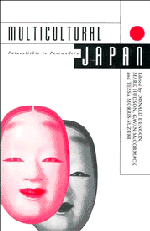Book contents
- Frontmatter
- Contents
- List of Figures and Tables
- List of Contributors
- Abbreviations
- Introduction
- Part 1 Archaeology and Identity
- Part 2 Centre and Periphery
- Part 3 Contact with the Outside
- Part 4 The Japanese Family
- Part 5 Culture and Ideology
- 14 Emperor, Rice, and Commoners
- 15 Two Interpretations of Japanese Culture
- 16 Kokusaika: impediments in Japan's deep structure
- Afterword: Diversity and Identity in the Twenty-First Century
- Index
15 - Two Interpretations of Japanese Culture
from Part 5 - Culture and Ideology
Published online by Cambridge University Press: 05 November 2011
- Frontmatter
- Contents
- List of Figures and Tables
- List of Contributors
- Abbreviations
- Introduction
- Part 1 Archaeology and Identity
- Part 2 Centre and Periphery
- Part 3 Contact with the Outside
- Part 4 The Japanese Family
- Part 5 Culture and Ideology
- 14 Emperor, Rice, and Commoners
- 15 Two Interpretations of Japanese Culture
- 16 Kokusaika: impediments in Japan's deep structure
- Afterword: Diversity and Identity in the Twenty-First Century
- Index
Summary
Introduction
In writing about Nihon bunka ron the first difficulty is how to translate the term. Commonly in English it is rendered as ‘Japanese culture theory’ or ‘theory of Japanese culture’, but the term ‘discourse’ may be more appropriate than ‘theory’.
The fact that there is such a thing as ‘Japanese culture theory’, or ‘Japaneseness’ (Nihonjinron) theory, has been seen as indicating a certain oddness about modern Japanese society. There are, I think, many elements of ‘Japanese culture theory’ which reveal either an inferiority complex in regard to Europe and the United States, or its opposite – narcissistic conceit and a sense of superiority. In this chapter, I stress the need to recognise this phenomenon, and to see it not just as a peculiarity but from a more universal point of view. It should be possible to cast light from a fresh angle on the nature of Japanese ‘distinctiveness’.
There is a ‘culture theory’ not only in Japan but in every country. In France, for example, discussions regarding the ‘French spirit’ (l'esprit français) have recurred since the eighteenth century. Against the background of a distinction between civilisation and culture, in Germany the notion of geist is set against the French concept of l'esprit. As for an ‘Australian culture theory’, a recent newspaper article discussed the need for ‘national awareness’ as a necessary part of the transition to a republican system of government.
- Type
- Chapter
- Information
- Multicultural JapanPalaeolithic to Postmodern, pp. 245 - 264Publisher: Cambridge University PressPrint publication year: 1996
- 1
- Cited by

